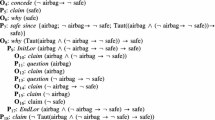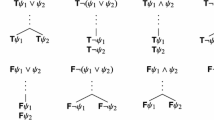Abstract
This investigation uses the technique of the profile of dialogue as a tool for the evaluation of arguments from ignorance (also called lack-of-evidence arguments, negative evidence, ad ignorantiam arguments and ex silentio arguments). Such arguments have traditionally been classified as fallacies by the logic textbooks, but recent research has shown that in many cases they can be used reasonably. A profile of dialogue is a connected sequence of moves and countermoves in a conversational exchange of a type that is goal-directed and can be represented in a normative model of dialogue. Selected case studies are used to probe special features of using the profile technique as applied to arguments from ignorance of a kind that occur frequently in everyday conversational exchanges. One of these special features is the use of Gricean implicature. Another is the need to use negative profiles of argument.
Similar content being viewed by others
REFERENCES
Barth, E. M. and E. C. W. Krabbe: 1982, From Axiom to Dialogue: A Philosophical Study of Logics and Argumentation, Walter de Gruyter, Berlin.
Copi, I. M.: 1982, Introduction to Logic, 6th edition, Macmillan, New York.
Felscher, W.: 1985, 'Dialogues, Strategies and Intuitionistic Provability', Annals of Pure and Applied Logic 28, 217–254.
Grice, H. P.: 1975, 'Logic and Conversation', in P. Cole and J. L. Morgan (eds.), Syntax and Semantics, vol. 3, Academic Press, New York.
Hamblin, C. L.: 1970, Fallacies, Methuen, London.
Hamblin, C. L.: 1971, 'Mathematical Models of Dialogue', Theoria 37, 130–155.
Harrah, D.: 1984, 'The Logic of Questions', in D. Gabbay and F. Guenther (eds.), Handbook of Philosophical Logic, vol. II, Reidel, Dordrecht, pp. 715–764.
Jacobs, S. and S. Jackson: 1992, 'Relevance and Digressions in Argumentative Discussion: A Pragmatic Approach', Argumentation 6, 161–176.
Krabbe, E. C. W.: 1992, 'So What? Profiles for Relevance Criticism in Persuasion Dialogues', Argumentation 6, 271–283.
Krabbe, E. C. W.: 1995, 'Appeal to Ignorance', in R. Pinto and H. Hansen (eds.), Fallacy Theory, Penn State Press, University Park, Pa.
Mackenzie, J.: 1981, 'The Dialectics of Logic', Logique et Analyse 5(24e), 159–177.
Mackenzie, J.: 1989, 'Reasoning and Logic', Synthese 79, 99–117.
Reiter, R.: 1981, 'On Closed World Data Bases', in B. Webber and N. Nilsson (eds.), Readings in Arificial Intelligence, Tioga, Palo Alto, pp. 119–140.
Reiter, R.: 1987, 'Nonmonotonic Reasoning', Annual Review of Computer Science 2, 147–186.
Schegloff, E. A: 1988, 'Presequences and Indirection', Journal of Pragmatics 12, 55–62.
Smets, P.: 1991, 'Varieties of Ignorance and the Need for Well-Founded Theories', Information Sciences 57–58, 135–144.
Smithson, M.: 1988, Ignorance and Uncertainty: Emerging Paradigms, Springer-Verlag, New York.
Walton, D.: 1989 Informal Logic, Cambridge University Press, Cambridge.
Walton, D.: 1989a, Question-Reply Argumentation, Greenwood Press, New York.
Walton, D.: 1996, Arguments from Ignorance, Penn State Press, University Park, Pa.
Walton, D.: 1996a, Argument Structure: A Pragmatic Theory, University of Toronto Press, Toronto.
Witte, C. L., A. Kerwin and M. H. Witte, 1991: 'On the Importance of Ignorance in Medical Practice and Education', Interdisciplinary Science Reviews 16, 295–298.
Wreen, M.: 1989, 'Light from Darkness, from Ignorance Knowledge', Dialectica 43, 299–314.
Author information
Authors and Affiliations
Rights and permissions
About this article
Cite this article
Walton, D. Profiles of Dialogue for Evaluating Arguments from Ignorance. Argumentation 13, 53–71 (1999). https://doi.org/10.1023/A:1007738812877
Issue Date:
DOI: https://doi.org/10.1023/A:1007738812877




